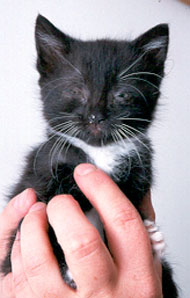- Home
- FAQs
- Customer Video Gallery
- Customer Photo Gallery
- Bird Facts
- Bird Food Blog
- Bird Information
- Feeding Advice
- Small Animal Information
- A to Z of Guinea Pigs
- A to Z of Hamsters
- A to Z of Rabbits
- Basic Care for Guinea Pigs
- Basic Care for Hamsters
- Basic Care for Rabbits
- Basic care for Chinchillas
- Basic care for Ferrets
- Basic care for Gerbils
- Basic care for Mice
- Basic care for Rats
- Buying a Healthy Small Animal
- Does your Reptile need a Licence
- Equipment for Ferrets
- Equipment for Hamsters
- Equipment for Mice
- Equipment for your Chinchilla
- Equipment for your Gerbil
- Equipment for your Guinea Pig
- Equipment for your Rabbit
- Keeping a House Rabbit
- Dog Information
- Cat Information
- Customer Information
- Fat Balls
- Suet Pellets
- Straights
- Seed Mixes
- Suet Treats
- Mealworms
- Bird Feeders
- My Account
Cat Flu
Cat flu is an infectious disease of the respiratory tract which is common in young kittens and unvaccinated cats. It can cause major disease outbreaks where there are large numbers of cats, such as rescue centres, boarding or breeding catteries.
What causes cat flu?
Despite its name, an influenza virus does not cause cat flu – it’s more like the cat version of a cold and there are several causes. However, two common viruses cause the vast majority (around 80%) of cases. The first, feline herpes virus (FHV), used to be called feline viral rhinotracheitis (FVR). The second is feline calici virus (FCV). Another infection, known as chlamydia, can also look like cat flu (see below). Some other infections are involved in certain cases and research in this area is still ongoing.
What are the symptoms?
The specific signs a cat shows depend on which infection is affecting him. Typical signs of FHV infection are severe: affected cats usually have a gluey, yellowish discharge from the eyes and nose, a high temperature, appetite loss and a listless, quiet appearance. Badly affected cats may have difficulty breathing.
In contrast, FCV infection tends to be less severe. There is discharge from the eyes and nose and although usually clear it can become yellow and sticky, as with FHV infection. One of the characteristic signs of this infection is the development of mouth and tongue ulcers, but despite them cats often keep eating. In rare cases, FCV infection may cause lameness and a high temperature.
Chlamydia infection causes eye discharge only. As the eyes become swollen the discharge can be severe, this infection may be mistaken for flu. However, chlamydia does not cause nasal discharge or other typical signs of flu.
Other infections have occasionally been found in cats with cat flu, and many viruses have been associated with sneezing and mild respiratory disease. Under recent study is a bacteria called Bordetella bronchiseptica. This bacteria appears to cause a nasal discharge and a slight cough, but it can cause pneumonia and death in young kittens – especially where they are infected with one of the viruses.
Is cat flu fatal?
It is unusual for cats to die of cat flu, but this does happen occasionally. It can make kittens extremely ill so good nursing is essential. Other cats at high risk from flu are those whose immune system is not working properly, such as those infected with the cat version of AIDS (caused by the feline immuno deficiency virus – FIV – or feline leukaemia virus – FeLV), cats on long-term steroid treatment, suffering from diabetes or receiving anti-cancer treatment.
Cat flu can also leave many cats with chronic disease. Damage to delicate eye and nose linings may cause long-term problems with eye disease or a runny nose. These chronic symptoms often need repeated, lifelong treatment.
What treatments are available?
There are no specific treatments for virus infections and affected cats are at risk of bacteria infecting tissues already damaged by a ‘flu’ virus. This is called ‘secondary infection’ and may be responsible for some symptoms. If Bordetella bronchiseptica is involved, antibiotics are extremely important so it is imperative that cats with flu receive immediate veterinary treatment. Good nursing is vital: keep cats comfortable and their eyes and nose clear of discharges. Eye discharge may cause the lids to fuse together, especially in young kittens, so it is important to clean them.
Warming up food, or offering strong-smelling food (eg pilchards or sardines), may tempt cats to eat, although those who are extremely ill may need to be drip- or force-fed. Some people suggest that steam inhalation can be helpful but it is difficult to get a cat to co-operate! It may take three to four weeks for all symptoms to improve and some cats with chronic symptoms (see above) never recover completely.
Twootz provides a great range of complete dry cat food specially formulated to provide all the nutrients necessary to maintain a nutritionally balanced diet that helps promote good health and vitality. Manufactured in the UK from quality ingredients this range has something for every cat.
Tip: Never give your cat any human remedies for flu. These usually contain aspirin or paracetamol and both are poisonous to cats.
How could my pet catch cat flu?
Cat flu may be caught from affected contemporaries, so felines with acute disease should be kept isolated from others. Viruses can also be spread indirectly on food bowls, clothes etc, so practice good hygiene if you are nursing a cat with flu. Suitable disinfectant from your pet shop or vet should be used to wash food utensils, bedding, work surfaces, doorframes, floors, etc.
Cats can also catch flu from felines who carry the viruses without showing signs of disease. After a cat has recovered from flu he becomes a carrier of the infection. FCV carriers tend to shed the virus for only a few months, but FHV carriers can shed it intermittently for life. This only usually gives cause for concern in situations where many cats are kept together.
Should my cat be vaccinated?
Vaccination of kittens is usually done at nine and 12 weeks of age, often combined with inoculation against other serious infections such as feline infectious enteritis and feline leukaemia virus. After the kitten’s vaccination course, an annual booster is recommended. The current cat flu vaccine protects against FHV and FCV disease and is usually effective in preventing serious disease, although some cats may still get mild signs. As cat flu is caused by a number of different infections, vaccination for cat flu is not 100% effective but is certainly valuable in preventing acute illness in the majority of felines. As cat flu can spread quickly in boarding catteries, all cats entering are usually required to be vaccinated.
Important – please read
Although our experts always do their best to help, this service is not intended to be a replacement for a one-to-one consultation with your own vet. If you are worried about any aspect of your animal’s health, wellbeing or behaviour, always contact your own vet as soon as possible. Neither Twootz nor its contributors can be held responsible for the consequences of people acting solely on the information given on this website without seeking appropriate professional advice.
What causes cat flu?
Despite its name, an influenza virus does not cause cat flu – it’s more like the cat version of a cold and there are several causes. However, two common viruses cause the vast majority (around 80%) of cases. The first, feline herpes virus (FHV), used to be called feline viral rhinotracheitis (FVR). The second is feline calici virus (FCV). Another infection, known as chlamydia, can also look like cat flu (see below). Some other infections are involved in certain cases and research in this area is still ongoing.
What are the symptoms?
The specific signs a cat shows depend on which infection is affecting him. Typical signs of FHV infection are severe: affected cats usually have a gluey, yellowish discharge from the eyes and nose, a high temperature, appetite loss and a listless, quiet appearance. Badly affected cats may have difficulty breathing.
In contrast, FCV infection tends to be less severe. There is discharge from the eyes and nose and although usually clear it can become yellow and sticky, as with FHV infection. One of the characteristic signs of this infection is the development of mouth and tongue ulcers, but despite them cats often keep eating. In rare cases, FCV infection may cause lameness and a high temperature.
Chlamydia infection causes eye discharge only. As the eyes become swollen the discharge can be severe, this infection may be mistaken for flu. However, chlamydia does not cause nasal discharge or other typical signs of flu.
Other infections have occasionally been found in cats with cat flu, and many viruses have been associated with sneezing and mild respiratory disease. Under recent study is a bacteria called Bordetella bronchiseptica. This bacteria appears to cause a nasal discharge and a slight cough, but it can cause pneumonia and death in young kittens – especially where they are infected with one of the viruses.
Is cat flu fatal?
It is unusual for cats to die of cat flu, but this does happen occasionally. It can make kittens extremely ill so good nursing is essential. Other cats at high risk from flu are those whose immune system is not working properly, such as those infected with the cat version of AIDS (caused by the feline immuno deficiency virus – FIV – or feline leukaemia virus – FeLV), cats on long-term steroid treatment, suffering from diabetes or receiving anti-cancer treatment.
Cat flu can also leave many cats with chronic disease. Damage to delicate eye and nose linings may cause long-term problems with eye disease or a runny nose. These chronic symptoms often need repeated, lifelong treatment.
What treatments are available?
There are no specific treatments for virus infections and affected cats are at risk of bacteria infecting tissues already damaged by a ‘flu’ virus. This is called ‘secondary infection’ and may be responsible for some symptoms. If Bordetella bronchiseptica is involved, antibiotics are extremely important so it is imperative that cats with flu receive immediate veterinary treatment. Good nursing is vital: keep cats comfortable and their eyes and nose clear of discharges. Eye discharge may cause the lids to fuse together, especially in young kittens, so it is important to clean them.
Warming up food, or offering strong-smelling food (eg pilchards or sardines), may tempt cats to eat, although those who are extremely ill may need to be drip- or force-fed. Some people suggest that steam inhalation can be helpful but it is difficult to get a cat to co-operate! It may take three to four weeks for all symptoms to improve and some cats with chronic symptoms (see above) never recover completely.
Twootz provides a great range of complete dry cat food specially formulated to provide all the nutrients necessary to maintain a nutritionally balanced diet that helps promote good health and vitality. Manufactured in the UK from quality ingredients this range has something for every cat.
Tip: Never give your cat any human remedies for flu. These usually contain aspirin or paracetamol and both are poisonous to cats.
How could my pet catch cat flu?
Cat flu may be caught from affected contemporaries, so felines with acute disease should be kept isolated from others. Viruses can also be spread indirectly on food bowls, clothes etc, so practice good hygiene if you are nursing a cat with flu. Suitable disinfectant from your pet shop or vet should be used to wash food utensils, bedding, work surfaces, doorframes, floors, etc.
Cats can also catch flu from felines who carry the viruses without showing signs of disease. After a cat has recovered from flu he becomes a carrier of the infection. FCV carriers tend to shed the virus for only a few months, but FHV carriers can shed it intermittently for life. This only usually gives cause for concern in situations where many cats are kept together.
Should my cat be vaccinated?
Vaccination of kittens is usually done at nine and 12 weeks of age, often combined with inoculation against other serious infections such as feline infectious enteritis and feline leukaemia virus. After the kitten’s vaccination course, an annual booster is recommended. The current cat flu vaccine protects against FHV and FCV disease and is usually effective in preventing serious disease, although some cats may still get mild signs. As cat flu is caused by a number of different infections, vaccination for cat flu is not 100% effective but is certainly valuable in preventing acute illness in the majority of felines. As cat flu can spread quickly in boarding catteries, all cats entering are usually required to be vaccinated.
Important – please read
Although our experts always do their best to help, this service is not intended to be a replacement for a one-to-one consultation with your own vet. If you are worried about any aspect of your animal’s health, wellbeing or behaviour, always contact your own vet as soon as possible. Neither Twootz nor its contributors can be held responsible for the consequences of people acting solely on the information given on this website without seeking appropriate professional advice.












